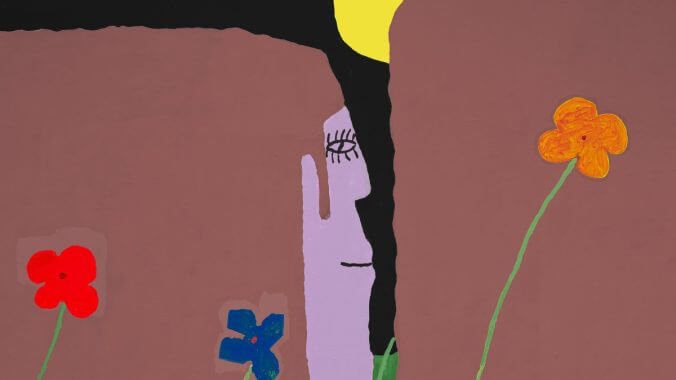Album of the Week | Slow Pulp: Yard
On their sophomore album and ANTI- debut, the Chicago quartet hone, solidify and diversify their slacker indie pedigree
Music Reviews Slow Pulp
There aren’t many bands who are on track to compose their whole discography in some state of isolation, but Chicago-via-Madison quartet Slow Pulp aim to accomplish that feat. After fountains of praise coated the fledgling indie rock’s psych-inflected EPs, the four-piece set out to craft a full-length that melded their wistful lyricism with woozy slacker rock. That would eventually become the sketches of 2020’s Moveys. What came next all seemed to happen so fast: lead singer Emily Massey was diagnosed with chronic mono and Lyme disease, her parents were involved in a serious auto accident and, then, the world went into indefinite lockdown in search of safety from a novel coronavirus. Massey finished Moveys alone, completing her vocals at home. As challenging as that isolation proved, Massey found herself best able to focus. Come February 2022, when the ideas for Slow Pulp’s next record (and first for ANTI-), Yard, began emerging, Massey chose a period of remoteness in a family friend’s remote cabin in Northern Wisconsin for a period in search of focus. That ability to choose solitude or community when necessary let the band come into a groove.
The truth is: Slow Pulp, as a band, have always seemed to have a groove all their own. Their downtempo, psychedelic approach to indie rock has its roots in Alex G-style slacker rock and intimate, Alvvays-style bedroom pop (two artists they’ve, coincidentally, toured with in the past). The music is approachable, yet it gets abrasive when it needs to. On Yard, Slow Pulp deploy those peculiar, harmonious sounds to unpack conflicting emotion—and their introspection is catchier than ever before. Yard tracks the band’s ever-evolving relationships with isolation and collaboration, the fluctuating roles one plays as an adult whose independence grows more complicated year after year. The album offers the ideal soundtrack for any mid-20-something who is caught re-assessing their social role in those unwieldy years that immediately follow college.
While a track like “Doubt,” with its ticking guitars and lackadaisical vocals, feels like the classic Slow Pulp of Moveys and before, Yard sees the band toy with its sound playfully and freshly. Massey pushes her vocals beyond the deceptively low-effort utterances that have become her trademark. Take “Cramps,” for example—a punk-leaning track with immersive guitars reminiscent of mall emo hits breaking only when Massey sustains: “But I want everything.” “Mud” is its closest neighbor, at times pummeling and at other instances crunchy, falling somewhere between pop punk and fuzz rock. The real outlier on the record is “Broadview,” where pedal steel greets the listeners into a folksy ballad and Massey boasts a striking, unforgettable affection and warmth. On a typical Slow Pulp song, she seems like someone who can maintain a barrier between her feelings and her vocals, displaying ironic detachment—so it’s anomalous when she lets emotion rip through. “Carina Phone 1000” rests someplace closer to adult contemporary, not far from Sheryl Crow, without any refraction through an Alex G or Soccer Mommy prism. It’s a tad more vulnerable and just as rewarding.
Many of the best successes on Moveys came when Slow Pulp dialed up the distortion, and the same can be said of Yard. The shimmering guitars and crashing cymbals on “Worm” collide against Massey’s deep-fried voice uttering “I’ve got a worm / Inside my head” with contrasting nonchalance. Less intense (but heavy nonetheless) is “Slugs,” the indie rock hit of the summer. The plodding track narrates that intoxicating summer love sensation, bottling those feelings into what is, likely, the band’s strongest earworm. The sun-baked video that accompanies it captures that energy even better.
Yard is a genuine level up for Slow Pulp. While Moveys helped solidify the band’s familiar yet unmistakable sound, its subtleties could make the album’s strongest hits feel like flukes. On Yard, it’s hard to find a moment where the band doesn’t go for broke. When they’re not loud and in their well-worn lane, they’re experimenting with sounds they wouldn’t dare touch in their early days of making Crumb-adjacent psych-pop. They navigate these untouched territories with an ease that conventional indie rockers might not have the courage to tap into. While Slow Pulp still perform their best when they’re playing the blown-out slacker indie in which they’ve become experts, Yard reveals the band’s versatility—confirming that the band has extensive new sonic avenues to explore in depth moving forward. The album is already a delicious feast but, after this achievement, one can’t help but wonder what the band will try next.
Devon Chodzin is a critic and urban planner with bylines at Slumber Mag, Bandcamp Daily and more. He is currently a student in Philadelphia. He lives on Twitter @bigugly.